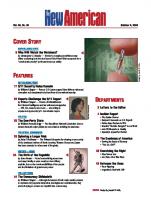The American Surveillance State: How the U.S. Spies on Dissent [EPUB ed.] 9780745346038, 0745346030
New evidence has come to light proving how far the FBI monitored its citizens throughout the Cold War and beyond When t
196 4 1MB
English Pages 368 Year 2022
Table of contents :
Preface
Acknowledgments
Abbreviations and Codenames
Introduction
Part I: The Long View: Historical Perspectives of American Surveillance
1. J. Edgar Hoover and the FBI’s Institutionalization of Surveillance
2. Memory's Half-life: Notes on a Social History of Wiretapping in America.
3. The New Surveillance Normal: Government and Corporate Surveillance in the Age of Global Capitalism.
Part II: Lanting Those with a Communist Taint
4. The Dangers of Promoting Peace During Times of [Cold] War: Gene Weltfish, the FBI, & the 1949 Waldorf Astoria’s Cultural and Scientific Conference for World Peace
5. Tribal Communism Under Fire: Archie Phinney and the FBI
6. The FBI’s History of Undermining Legal Defenses: From Jury Panel Investigations to Defense Lawyer Surveillance Programs
7. Agents of Apartheid: Ruth First and the FBI’s Historical Role of Enforcing Inequality
Part III: Monitoring Pioneers and Public Intellectuals
8. How the FBI Spied on Edward Said
9. Seymour Melman: the FBI’s Persecution of the Demilitarization Movement
10. Traces of FBI Efforts to Deport a Radical Voice: On Alexander Cockburn’s FBI File
11. Medium Cool: Decades of FBI Surveillance of Haskell Wexler
12. Blind Whistling Phreaks and the FBI’s Historical Reliance on Phone Company Criminality
13. The FBI and Candy Man: Monitoring Fred Haley, A Voice of Reason During Times of Madness
14. David W. Conde, Lost CIA Critic and Cold War Seer
Part IV: Policing Global Inequality
15. E. A. Hooton and the Biosocial Facts of American Capitalism
16. Walt Whitman Rostow and FBI Attacks on Liberal Anti-Communism
17. André Gunder Frank, the FBI, and the Bureaucratic Exile of a Critical Mind.
18. Angel Palerm and the FBI: Monitoring a Voice of Independence at the Organization of American States
19. The FBI’s Pursuit of Saul Landau: Portrait of the Radical as a Young Man
Conclusion
Preface
Acknowledgments
Abbreviations and Codenames
Introduction
Part I: The Long View: Historical Perspectives of American Surveillance
1. J. Edgar Hoover and the FBI’s Institutionalization of Surveillance
2. Memory's Half-life: Notes on a Social History of Wiretapping in America.
3. The New Surveillance Normal: Government and Corporate Surveillance in the Age of Global Capitalism.
Part II: Lanting Those with a Communist Taint
4. The Dangers of Promoting Peace During Times of [Cold] War: Gene Weltfish, the FBI, & the 1949 Waldorf Astoria’s Cultural and Scientific Conference for World Peace
5. Tribal Communism Under Fire: Archie Phinney and the FBI
6. The FBI’s History of Undermining Legal Defenses: From Jury Panel Investigations to Defense Lawyer Surveillance Programs
7. Agents of Apartheid: Ruth First and the FBI’s Historical Role of Enforcing Inequality
Part III: Monitoring Pioneers and Public Intellectuals
8. How the FBI Spied on Edward Said
9. Seymour Melman: the FBI’s Persecution of the Demilitarization Movement
10. Traces of FBI Efforts to Deport a Radical Voice: On Alexander Cockburn’s FBI File
11. Medium Cool: Decades of FBI Surveillance of Haskell Wexler
12. Blind Whistling Phreaks and the FBI’s Historical Reliance on Phone Company Criminality
13. The FBI and Candy Man: Monitoring Fred Haley, A Voice of Reason During Times of Madness
14. David W. Conde, Lost CIA Critic and Cold War Seer
Part IV: Policing Global Inequality
15. E. A. Hooton and the Biosocial Facts of American Capitalism
16. Walt Whitman Rostow and FBI Attacks on Liberal Anti-Communism
17. André Gunder Frank, the FBI, and the Bureaucratic Exile of a Critical Mind.
18. Angel Palerm and the FBI: Monitoring a Voice of Independence at the Organization of American States
19. The FBI’s Pursuit of Saul Landau: Portrait of the Radical as a Young Man
Conclusion
![The American Surveillance State: How the U.S. Spies on Dissent [EPUB ed.]
9780745346038, 0745346030](https://ebin.pub/img/200x200/the-american-surveillance-state-how-the-us-spies-on-dissent-epubnbsped-9780745346038-0745346030.jpg)




![Watching Earth from Space: How Surveillance Helps Us -- and Harms Us [1 ed.]
1441969373, 9781441969378](https://ebin.pub/img/200x200/watching-earth-from-space-how-surveillance-helps-us-and-harms-us-1nbsped-1441969373-9781441969378.jpg)




